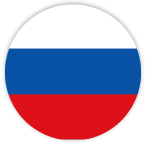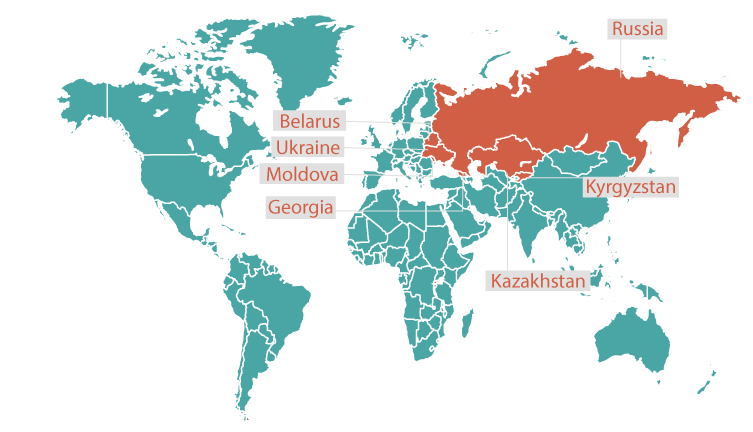Russian Translation Services

Language History
The 10th century saw the development of three Slavonic language groups – Western, Southern and Eastern. Eastern Slavonic soon developed into what we know today as Ukrainian, Belorussian and Russian.
The three language groups used one common written language – Old Church Slavonic. It was in the 9th century when the Cyrillic alphabet was introduced by missionaries, Cyril and Methodius.
In Russia, Old Church Slavonic was the official written language until the 18th century when a new written language developed based on the educated spoken norm. The three language styles, High Style, Middle Style and Low Style were introduced by the famous M. V. Lomonosov. With features of East and Church Slavonic, the Middle Style is in fact what helped form the foundations of the modern standard language. It was in the 19th century when Standard Russian, based on the Moscow dialect became the official language.
Where is Russian Spoken?
It is spoken in countries including Russia, Belarus, Kazakhstan and Kyrgyzstan and it is considered an unofficial lingua franca in countries including Ukraine, Azerbaijan, Estonia, Georgia, Latvia, Lithuania, Moldova, Tajikistan, Turkmenistan and Uzbekistan.

FACT
Did you Know?
Over 850,000 Americans speak Russian!
It is one of the top 15 non-English languages in the U.S!
• New York (130,296 speakers) • California (73,133 speakers)
• Washington (25,421 speakers) • Illinois (19,419 speakers)
• New Jersey (18,816 speakers) • Pennsylvania (17,418 speakers)
• Florida (16,572 speakers)
(Figures – unitedlanguagegroup)

Tip!
If you learn Russian, it will be easier for you to learn other
Slavic languages like Polish, Czech,Bulgarian or Croatian!
Russian words are similar to English!
• Проблема (problema) – problem
• Кофе (kofi) – coffee
• Чизкейк (cheez-keyk) – cheesecake
• Музыка (moozika) – music
• Бургер (boorger) – burger
• Лимон (leemon) – lemon
English–Russian False Cognates
• Artist – Артист (actor)
• Decoration – Декорация (setting)
• Cabinet – Кабинет (office, study)
• Magazine – Магазин (shop)
• Family – Фамилия (surname)
• Operator – Оператор (cameraman)
Some words are very different to English although they look/sound the same!
Top 10 Russian-Speaking Countries
Source: worldatlas (2018 figures)
FACT
Population vs. Internet Penetration
Russia Population:
143,964,709
Internet Users:
109,552,842
Penetration:
76.1%
As of 2017. Source: www.internetworldstats.com
Russian Translation Tips
• Russian nouns have 12 variations depending on how they’re used in a sentence. There are also many Russian verbs whose endings depend on tense, gender, mood, and amount.
• Know your audience – Russian translates differently depending on whether you use formal or informal registers.
• Watch out for punctuation – Russian uses chevrons («») as quotation marks and the “ symbol isn’t used at all! Also, the dollar sign is placed after numbers!
• The average Russian word contains 7.2 symbols, while the average English word contains 5.2 symbols – Russian translations will usually grow by 20% in character count so always allow more space!
• Native Russian words hardly ever start with the letter “A” except for a few like азбука (alphabet) and авось (perhaps).
• The way you order words doesn’t really matter in the Russian language (in terms of grammar).





